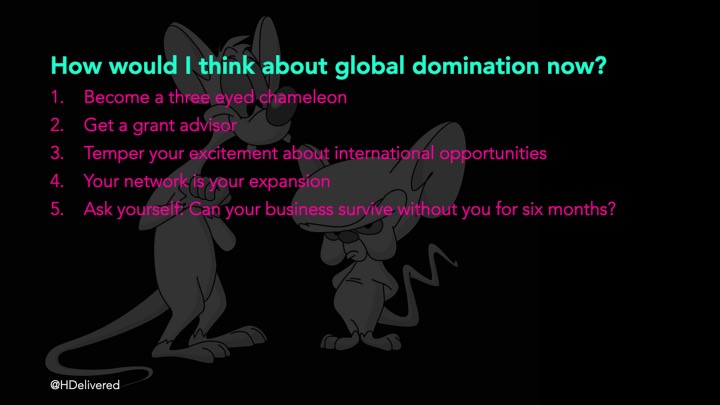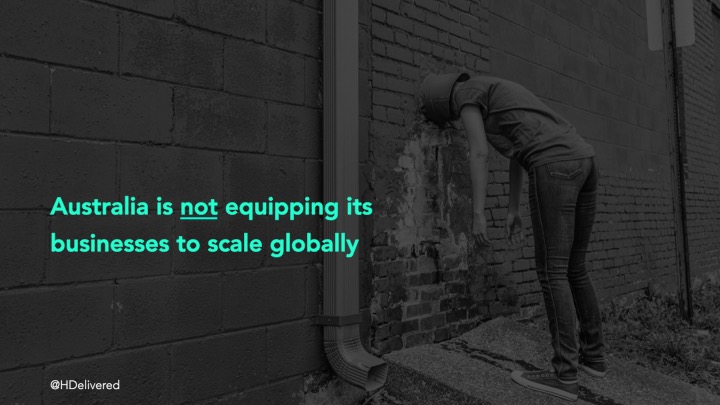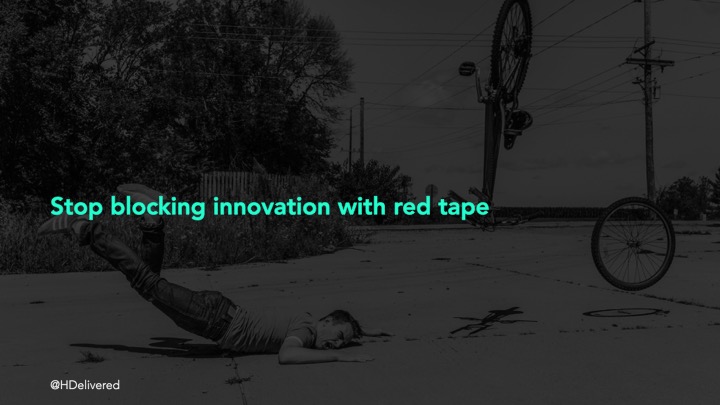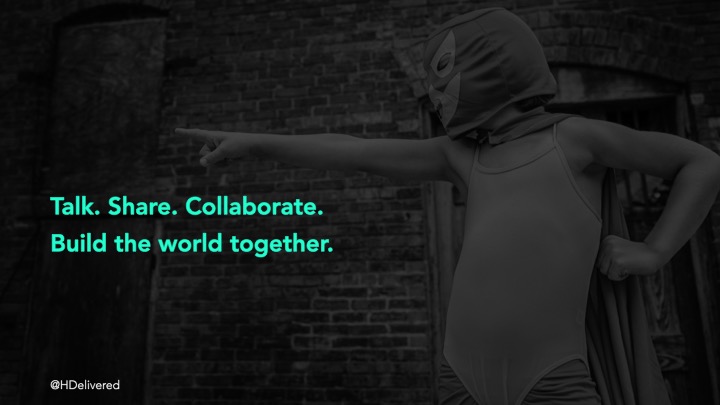
The following is a rough transcript of my presentation from PauseFest 2018.
My name is Pete Saunders.
Today I am going to talk to you about what it’s like to start a business in Australia and scale it globally.

Well, that’s not entirely true. Because we haven’t managed it yet. So to be more precise, I’m going to talk about how difficult it can be to compete globally from Australia, what I’ve learned along the way, where I think our ecosystem fails us and what we can do to better support one another.
For anyone who is doing it, has tried to do it or is thinking about doing it, starting a business is hard. It is harder than anything I have ever done in my life. But it is more fulfilling and I wouldn’t ever go back to normal life. Nevertheless it needs to be said — it is difficult. VERY difficult.
Much as I would love to think my company is different, we are not. We face the same challenges, the same pitfalls, the same issues.
What I want to describe is our journey, and while I’m sure there will be points of contention or difference, I don’t think we’re too far off average.

By way of background, Health Delivered is a dietary management platform. A little over two years ago, we set about trying to create tools to improve how we manage Australians with chronic diseases and reduce the burden on the health care system.
Over the past two years, I have pitched on stage in Australia, China and in the UK. I have worked with researchers in Australia, the UK, Italy and the US. I have made very good connections with collaborators in the UK, Europe and US.

Here in Australia, six of us work in our spare time. We all have full time jobs. But every moment we can, we’re progressing the product. We have varied backgrounds, but I will admit our biggest gap is not having a technical cofounder.

12 months ago, we won the pitch comp at PauseFest when we were just a concept. A good concept, sure, but we had not written a line of code.
We are a high risk, huge potential start up that has received global interest and attention. But here I am today, with no real impact to speak of out of outside Australia. How come?
As the theme of the conference is about journeys, where on the journey are we?

I presume everyone here is familiar with the start up valley of death.

Well, happily I can share with you that we are right here. Smack bang in the depths of the valley. And you know what? The valley is a fucking hard place to be. It is a tiring, lonely, depressing place.
And what frustrates me most about being stuck here is that in Australia, it’s not easy to connect with others in the same place. I know they’re out there, but they’re hard to find.
So for today’s talk, here is my basic premise.

I think the Australian ecosystem struggles in a number of areas. Some are downright failures. But with all of these problems come the opportunities to improve. And that’s what I want to get into today.
Having spoken to thousands of people over the last couple of years, my understanding is that starting a business in Australia generally faces a number of hurdles, and most importantly, we are not equipping businesses with the opportunities and capital to scale globally. This happens at a national, local and start up levels.
So along the way, I’ve learned a few things…

For anyone who has spent time in the valley you’ll know that yes, it is a hyper charged, hyper competitive bubble that exists on its own terms. But if you go there, you will also learn that people want to learn, share and collaborate as much as they can.
Because they understand that by doing this, they can continue to advance their own agendas as much as possible. Yes it’s cutthroat, but sharing and collaboration can be mutually beneficial.
In Australia we have this view that our IP is ours alone and no one else should benefit from it without paying. I discussed this with a couple of commercialization experts and their description was perfect.

It’s quite a good analogy because it negates size of market. Yes we are significantly smaller than the US, but if we are fighting over the same scraps, we will never progress as a country.
If our mindset is that what’s yours is not mine, then eventually the money, resources, talent and desire will dry up.
As a so called innovative country, we owe it to ourselves to collaborate more openly.
Consider a country like Estonia. With only 1.3 million people, they have focused on innovation through coding, data sharing and proper governance. They are proof that size is no issue if you have the right approach.
Or Israel. A third of the population of Australia, but one of the biggest and best spots for innovation globally right now.
What this means is that we drive talent away. It gets caught up either in overseas adventures, or to the highest bidders — usually banks and major services.

Right now, our financial projections for Series A funding list developers earning around $130,000 a year. It’s a competitive wage that is starting to be on the lower end of the spectrum.
Every time I speak to an investor, they have questions about our financial figures. Why does a start up need to pay a developer six figures? And the question is valid, if our goal was to create a product with sub-standard, flawed code. Which given we are dealing with health data, actually would make us an insurance threat.
But there is still cognitive dissonance between seeking high quality innovations and penny pitching at every opportunity.
So we need to pay for the right talent. And unfortunately, start ups are quickly getting priced out of the market because larger organisations have realised they need to and can pay for the right people.

When people ask me whether there’s a skills shortage in Australia, my answer is somewhere between yes and no. Financials aside, we do have the talent, but we struggle to retain it. We struggle because we have not created an ecosystem that collaborates, fosters innovation within itself and pushes itself to excel.
We do not create opportunities for ourselves at a basic, start up level, which makes it all the more challenging to attract and retain the highest level talent. Opportunities more often than not are created from collaboration.
So let’s talk about collaboration in Australia.
Here is one perfect example from a start up group that I am part of on Facebook.

Here we have a reasonable offering from someone looking to create a network in the community.

Here we have a somewhat unsurprising response.
Unfortunately I say unsurprising because this is happens often. I have heard ‘no’ more often in Australia than any other country. And these comments permeate social media. Here is one that came from discussing this very talk.

And the comment that’s hidden?

Is this really the culture we want to create for ourselves? These are comments from people who live right here. And they are frequent and pervasive. How can we expect our own ecosystem to attract the right sort of talent, if we cannot even accept talent ourselves?
I used the image from Linkedin as a segue to my next point.

Since winning Pause Fest, we have managed to raise $235,000 in cash, $25,000 in no interest loans, $65,000 in grants and $60,000 in R&D. I call these out individually, because each has been an arduous task to undertake.
Our operating budget for a little over 12 months has been nearly $400,000 with most of that going to software development. As I said before, we have no technical co-founders which is certainly a challenge, but not an insurmountable one.
I think this is important to note because we have been one of the few companies to raise money pre-product and have been able to secure research and corporate dollars.
With that money, we have developed our MVP, conducted and completed beta testing, launched to private practice dietitians and within the next month we will be generating some revenue.

It took us over a year to find the first dollars, and that was an outcome of persistence and a lot of luck. Importantly for us, we continued to work on the product and the business so we could at least show progress. If you’re not progressing, you’re dying.
More and more stories pop up about early stage funding, investment companies and other funding avenues. There is a lot of talk. But getting someone to sign a cheque is incredibly rare. This is feedback I have heard from numerous people. Some of whom have gone to pick up funding overseas and have taken themselves there.
Scrapping over these funds has been a balancing act of competing interests and negotiations. I want to highlight the grant money here, because they are related to a major frustration about access to early stage funding.

If I do a quick search to look for funding that we qualify for, the best I can get is a City of Melbourne grant for $20,000. Paid out over twelve months.
Dig a little deeper and you start to uncover any number of great options for government grants. But most have caveats that disqualify lots of really high potential start ups
The ones that we are most suited to usually involve innovation connections or research. And these are the qualifications needed for a start up.

It seems ludicrous to me that a start up needs to be generating over $1.5mil in revenue to qualify for a $50,000 grant. It flies in the face of what we should really be doing — providing small but targeted funding to high potential start ups and creating an environment that they can succeed, not a bureaucratic, red tape time suck.
We were genuinely lucky that our development team decided to support us through the grant process. They qualified and were therefore able to submit on our behalf. We could double our budget, extend our roadmap and dedicate more resources. Everyone wins.
Except as usual, they don’t.

Paperwork errors, IP assignments and general admin meant that not only did we risk losing both grants due to timelines, we actually lost $25,000 due to a clerical error. For every moment of excitement when funding comes through, is countered by half a dozen where you wonder why you even bothered.
Surely there are ways that start ups can gain more support. I compare this to discussions that are underway with an organisation in Italy. They are helping us launch pilots there and then the EU. Without breaking a sweat, we can access 200,000 Euros. All we need to do is have a server that runs locally, and a specific hypothesis to test that show we have scalable technology across borders.

Currently, it looks like most support is going towards incubators and accelerators. Which is nice in principle, but also allows the government to stay one step removed from risk. They will fund the people who will then take on the risk register of businesses, instead of creating new ways to de-risk high quality start ups.
But does Australia need more incubators and accelerators? I’m genuinely curious about this because in my experience, the ones we have often don’t work properly and newer ones being set up are as a result of opportunity, not need.
I will admit that I am jaded by this because we were burned and burned badly.

We were part of this story last year. It is one of the most difficult, depressing and challenging events of my life. Not just with our company, but my entire life. It took over a year to come to grips with the damage this created for myself — personally, professionally and financially.
And what’s saddest of all is that I know there were at least ten other companies who experienced the same thing, but they did not want to come forward and did not want their name published.

The reason this story still eats me up is that I look at the potentially irreversible damage to an ecosystem I love. This whole event caused people to lose their jobs, innovations to die and people to genuinely give up on their dreams.
Sharks will pray on you no matter were you are, but in Australia where the ecosystem is smaller and more fragile, we run the risk of being consumed by sharks. Like my point before about collaboration, I also think we should speak more openly about this.
We should talk about the people and the companies and the incubators and the accelerators that are in it for their own reasons, not to help Australian companies succeed. If we do not, and if we continue to exist in our shells, this will happen time and time again. We will stagnate and only be able to blame ourselves.

As mentioned, I have pitched all around the world. I have given some good pitches and I have given some absolutely terrible pitches. But one thing I have observed is that the way we think about pitches and the culture associated needs to be overhauled.

For anyone who has taken part in a local pitch comp, this prize list looks familiar. Because it was pretty much the prize for every pitch comp last year. Yes there were some exceptions, but overwhelmingly this is what people could win.
It does seem silly to be saying hey, no, let’s stop great companies giving up time, credits and expertise. And I don’t want that to be the case.
But what gets me is that we’ve allowed ourselves to create an environment where same same is the benchmark. I can go to any pitch night and see the same people, the same companies, the same judges and hear the same outcomes.
We’re doing so little to progress within our own environment because we are continually accepting the same. But there’s one fundamental difference that still resonates with me. And it’s what we ask of those pitching.

This question is everything. The ask. But it’s one thing to have an ask in a pitch, it’s very much another thing to be the basis of how you approach someone.

I met some incredible people in the UK and this was how they approached me. They were open to help, collaborate, offer assistance. Whatever was needed, they were and still are willing to offer support. I would take a high quality introduction over a $500 gift voucher any day of the week.
Again, if we cannot promote and push ourselves, we should never expect to be taken seriously on a global level. Which brings me to the most obvious points.

There is some truth to the fact that Australia is a relatively small country. When I pitched in China, I was in Suhzou with a population of nearly 11 million. That is a second tier city.
So yes, we struggle by simple numbers. But where we excel is in diversity. We can create any number of test cases for products across socioeconomic, cultural and ethnic backgrounds. It is possible to create globally relevant test cases through the populations we have and without them, no one globally will be interested in you.
In fact, most overseas investors want to see local traction. They want to know that your product is transferrable across borders and what you’re doing here can work there.
Finally, what is also lost is that many overseas investors are not able to put money into Australian companies. Or if they can, it comes with significant red tape. They want local, so you’ll have to become local.

This one is unfortunately also true. It gets easier through Skype or Zoom, we can work through Slack or Trello. But at the end of the day, we are at the bottom of the world.
An American advisor told me that to get set up in the US, I had to be on the ground for three out of every four weeks for five our of every six months. You simply cannot become global without spending the time.
This is a reality we all have to come to grips with. From my point of view, the misconception is that a global business cannot be based in Australia. I think there are many ways to approach that, because let’s face it, living in Australia is fantastic. And despite my relentless global ambitions, I always want this to be my home.
There is a huge opportunity to promote Australia as a globally relevant ecosystem through our diversity and quality of life. We should not be afraid to bring innovation here as it would improve the whole landscape.

I realise that I have shared a lot of gripes. And the world really isn’t that bad. We live in an amazing place and I have to acknowledge that I think Australia has recognised its position and is moving in the right direction. But we are at the bottom of the world and we have a lot of work to do.
For anyone who has similar global ambitions, I have these five thoughts.

1. Running a start up means one eye on now and one eye on what’s next. If you’re thinking about going international, you need to be looking one step beyond that.
Keep track of things however you can because you will have so many competing interests.
2. While I dislike the grant landscape for early stage start ups, I think there are many opportunities for bigger companies, particularly those looking overseas. But grants are a total headfuck and you will lose weeks of time and sleep if you are not a natural grant writer. Get an advisor to help you navigate the landscape and prepare the documents for you. Grants are there to help you succeed but you need to speak a very specific language.
3. The world is big, and exciting and full of opportunities. And they are bigger and larger and more enticing than most available here. You will want to go after all of them.
But remember that they take time, energy and investment. They will be a distraction from your day to day and will never happen as quickly as you want.
4. You cannot be everywhere at once. How you scale to the US or the UK or China will depend on the strength of the network you have created already. You need local partners to help you navigate the landscape. Spend time and effort building those networks, because they will be the ones who will keep things going in your absence.
For all the months you’ve spent building trust locally, you need 10x that overseas because you will always be an intruder.
5. This is the final point on the checklist. It’s the one that I think about most when considering our international plans. Can your business survive and thrive in your absence? If the answer is no, then you are not ready.
You need to be firmly secure in Australia because once you’re overseas, the game will change. Be sure that removing yourself from the day to day won’t cause the engine to fall apart.
I want to finish by coming back to original premise.

There are some things we cannot change. We cannot change where we are in the world and we cannot change the relative size of our population. But these should be seen as opportunities, not hindrances.
We should be making ourselves a destination for innovation, not notorious for letting it go overseas.
So how do I think we can do this?

Firstly, I think those guys are awesome and I use their products every day. But one global success does not make an ecosystem.
We should be focusing on the companies who are ready to take it to the global stage. Talk about who they are, what they need, where they struggle, what they’ve learned.
There is a whole raft of middle tier innovations that could take the world by storm if they were given the right platform. So instead of saying ‘well these guys did it, so everyone can’, what are we doing to create the next 10, 20, 100 Atlassians?

Whether these are real innovation grants, or early stage funding, or programs created to help start and more importantly scale businesses, Australia can do so much more to support ideas at every stage of the journey.
Instead of saying no, find new ways to mitigate risk and harness ideas.
I believe the government should be providing more targeted funding, incubators should be created to enable ideas to succeed, and we should be able to bridge the gap between innovation, research and commercialization. These are big challenges but they are happening globally and they are happening now.

This is where I want to end because I think it’s the one thing each and every one of you in this room can do today.
Take a coffee with someone, make an introduction, share ideas, share pitfalls, highlight success and dissect failure. Create a more innovative ecosystem from within. We owe it to ourselves to play on a global scale and until we stop fighting with each other and grow up, it will never happen.
Australia will only be as big or as small as it believes itself to be. The sooner we put our big boy pants on, the sooner people will start taking us seriously.
Innovation is exciting. It is what gets me out of bed every morning. And the Australian ecosystem is slowly changing. But innovation was never about moving slowly. Think about what you can today, not just for yourself, but to make everyone’s tomorrow more exciting.
Thank you.